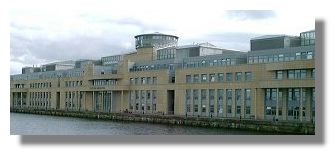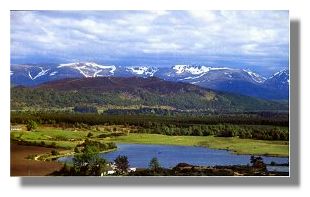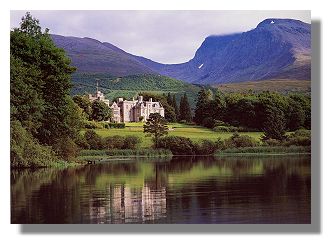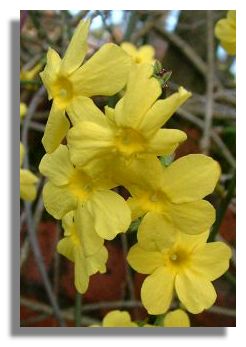Crescent Bridge Sweeps to Victory
 Although it was described as a "long way for a shortcut", a crescent-shaped bridge has won a design competition for a new pedestrian crossing over the river Clyde in Glasgow. Designed by leading British architects Richard Rogers Partnership, "Neptune's Way" was selected from a short list of six proposals. The new bridge will connect two new public parks at the financial centre being built on the north bank at Broomielaw and Tradeston on the south side, where a new residential area is to be created. There will be a new mooring point for the "Pride o' the Clyde" river taxi service which runs downriver to Braehead near Renfrew. It will be another year before work starts on the new bridge and it is expected to be completed in 2007.
Although it was described as a "long way for a shortcut", a crescent-shaped bridge has won a design competition for a new pedestrian crossing over the river Clyde in Glasgow. Designed by leading British architects Richard Rogers Partnership, "Neptune's Way" was selected from a short list of six proposals. The new bridge will connect two new public parks at the financial centre being built on the north bank at Broomielaw and Tradeston on the south side, where a new residential area is to be created. There will be a new mooring point for the "Pride o' the Clyde" river taxi service which runs downriver to Braehead near Renfrew. It will be another year before work starts on the new bridge and it is expected to be completed in 2007.
Tourism Spending Grows by 10%
The latest tourism figures, from January to July this year, show that although the number of tourists fell slightly, there was a 10% growth in tourism spending in Scotland. UK figures overall dropped by one per cent over the same period. Business tourism, which accounts for over 30% of tourist spending in Scotland, has been growing even faster. The latest statistics were welcomed by the Tourism Minister Frank McAveety at the annual "Scotland United" conference in Glasgow which brought together all the main agencies involved in attracting tourists to Scotland. The minister described the figures as a remarkable achievement which underpins the statement that the industry is one of the fastest growing parts of the Scottish economy. If Scottish tourism could consistently match the 4% compound growth in world tourism, spend in Scotland would increase hugely - by perhaps half as much again in a decade.
15,200 Government Staff
 The number of administration and agency staff employed by the government in Scotland has grown by 17% since the devolved parliament was set up in Edinburgh in 1999. The number of civil servants working directly for the Scottish Executive is now over 4,200, an increase of 25% since 1999. And the numbers employed in executive agencies has risen to over 11,000 over the same period. The cost of running the devolved administration is now £227 million compared with £154 million in 1999. Officials argue that increases are partly due to inflation and that the greater workload and areas of responsibility being undertaken necessitated the increase in staff numbers.
The number of administration and agency staff employed by the government in Scotland has grown by 17% since the devolved parliament was set up in Edinburgh in 1999. The number of civil servants working directly for the Scottish Executive is now over 4,200, an increase of 25% since 1999. And the numbers employed in executive agencies has risen to over 11,000 over the same period. The cost of running the devolved administration is now £227 million compared with £154 million in 1999. Officials argue that increases are partly due to inflation and that the greater workload and areas of responsibility being undertaken necessitated the increase in staff numbers.
The illustration is of the Scottish Executive offices at Leith.
Government Cash for Mountain Rescue
The amount of cash allocated by the government to voluntary mountain rescue teams has been increased to £400,000 - a four-fold increase on previous levels. First Minister Jack McConnell, announcing the finance at Ballater this week, said that Scotland's mountains are one of the country's greatest natural assets and are enjoyed by many thousands of Scots and tourists alike. They play a vital role in tourism and in growing the economy of the Highlands and Islands. But they can also be dangerous places. That is why the government are increasing the funding for the teams who regularly save lives on Scotland's mountains. They commit so much of their own time and money, often risking their own lives. This new money will make sure that teams across Scotland will be better trained and have access to better equipment. But the rescue teams are still voluntary and still depend on public support. Critics say that this latest cash injection is still not enough.
Statistical Error Loses Highlands £250 Million
 One of the objectives of European Union finance is to provide aid to underdeveloped regions within the Union, using money raised from all the member countries. This has meant that from 1994 to 2000, the Highlands of Scotland saw substantial investment from European central funds, which helped to pay for many important infrastructure projects across the region. But after 2000, the statistics provided by the UK Office of National Statistics (ONS) appeared to show that the Highlands income had risen above the 75% of the European average for gross domestic product (GDP) which was the cut-off point. But now the ONS has produced revised figures - which prove that the Highlands had not performed an economic miracle and was actually below the 75% level. But it is too late to go back to the European Union and claim the investment cash. The current arrangements are fixed until 2006. After that, with the European Union expanding to take in poorer east European countries, it is unlikely that the Highlands will qualify under any new arrangements.
One of the objectives of European Union finance is to provide aid to underdeveloped regions within the Union, using money raised from all the member countries. This has meant that from 1994 to 2000, the Highlands of Scotland saw substantial investment from European central funds, which helped to pay for many important infrastructure projects across the region. But after 2000, the statistics provided by the UK Office of National Statistics (ONS) appeared to show that the Highlands income had risen above the 75% of the European average for gross domestic product (GDP) which was the cut-off point. But now the ONS has produced revised figures - which prove that the Highlands had not performed an economic miracle and was actually below the 75% level. But it is too late to go back to the European Union and claim the investment cash. The current arrangements are fixed until 2006. After that, with the European Union expanding to take in poorer east European countries, it is unlikely that the Highlands will qualify under any new arrangements.
Broadband Campaign Begins
 Government efforts to increase the use of Broadband by small and medium sized enterprises in Scotland were boosted this week by a campaign fronted by TV personalities Ford Kiernan and Elaine C Smith. The campaign will initially be run on radio and in newspapers. A website and hotline, giving impartial advice on how best to access broadband, will form part of the promotion. Scottish broadband coverage (65 per cent) is currently less than across the UK as a whole (around 80 per cent), and this initiative is part of efforts to increase the Scottish take-up by business. British Telecom - who lost many potential broadband customers to cable companies with fibre optic cabling and lower prices - hopes to complete broadband coverage to every community in Scotland by 2005, but only if industry and government work together.
Government efforts to increase the use of Broadband by small and medium sized enterprises in Scotland were boosted this week by a campaign fronted by TV personalities Ford Kiernan and Elaine C Smith. The campaign will initially be run on radio and in newspapers. A website and hotline, giving impartial advice on how best to access broadband, will form part of the promotion. Scottish broadband coverage (65 per cent) is currently less than across the UK as a whole (around 80 per cent), and this initiative is part of efforts to increase the Scottish take-up by business. British Telecom - who lost many potential broadband customers to cable companies with fibre optic cabling and lower prices - hopes to complete broadband coverage to every community in Scotland by 2005, but only if industry and government work together.
Glasgow Launches Finance District in London
Representatives from leading financial companies in the City of London attended a launch of Glasgow's "International Financial Services District" this week. They heard about the plans to create 20,000 new jobs over the next eight years in the riverside area. But it was emphasised that Glasgow was not seeking to undermine the position of Edinburgh as the UK's largest financial centre outside of London. Glasgow already has 28,000 people employed in financial services companies, so it is building its new district on an existing base in the city. 400,000 sq ft of new office space has already been built at Broomielaw, out of a projected total of two million square feet by 2011.
Great and Good Fight Bank Branch Closure
 It is probably a coincidence, but as the Bank of Scotland fends off criticism for its plans to close its head office branch to the public - so that the space can be used for corporate entertaining - rival Royal Bank of Scotland is mounting a TV campaign saying that it is responding to customer demand and not closing branches. (Of course, the Royal Bank doesn't mention that it closed around 30% of its branches in the 1990s). The main attack on the Bank of Scotland's decision seems to be coming from retired senior executives and from retired senior judges and senior businessmen. They see the closure as a move away from the bank's roots, following the £29 billion merger with the Halifax to form "HBOS". The new chief executive is from Halifax and there is a feeling that the centre of power is moving from Edinburgh to Halifax in England. Further evidence is seen in the move to replace tartan Bank of Scotland female staff uniforms with plain navy.
It is probably a coincidence, but as the Bank of Scotland fends off criticism for its plans to close its head office branch to the public - so that the space can be used for corporate entertaining - rival Royal Bank of Scotland is mounting a TV campaign saying that it is responding to customer demand and not closing branches. (Of course, the Royal Bank doesn't mention that it closed around 30% of its branches in the 1990s). The main attack on the Bank of Scotland's decision seems to be coming from retired senior executives and from retired senior judges and senior businessmen. They see the closure as a move away from the bank's roots, following the £29 billion merger with the Halifax to form "HBOS". The new chief executive is from Halifax and there is a feeling that the centre of power is moving from Edinburgh to Halifax in England. Further evidence is seen in the move to replace tartan Bank of Scotland female staff uniforms with plain navy.
Scottish Police to Shoot First
A pilot scheme using the latest camera phones has proved to be so successful in catching vandals and graffiti artists that police forces across Scotland are to be issued with this latest technology. The photographs have allowed the distinctive styles of graffiti to be identified and criminals caught in the act can then be charged with other instances. The possibility of using camera phones to check identities against computerised databases of criminals is also being investigated.
Bank Giving Away Money
 People using The Royal Bank of Scotland’s cash machines over the next few weeks could withdraw more than they bargained for and pick up one of six £10,000 cash prizes. Six ‘Golden Tickets’ worth £10,000 each are being randomly loaded into the Bank’s 1,359 cash machines between 21 November and 7 December, delivering an early Christmas present to the lucky winners. The Royal Bank has one of the most comprehensive ATM networks in Great Britain, with 1,359 machines located as far north as the Shetland Isles and as far south as Cornwall. Last year, a staggering 100 million people visited Royal Bank cash machines withdrawing a total of £5.7 billion, with an average withdrawal of £56 per person. And as half the people using the Royal Bank's machines are not their customers, it is likely that a similar percentage of the winners will not be customers of the Royal Bank. Last December the bank's machines dispensed over a billion pounds in what is always the busiest month of the year for the machines.
People using The Royal Bank of Scotland’s cash machines over the next few weeks could withdraw more than they bargained for and pick up one of six £10,000 cash prizes. Six ‘Golden Tickets’ worth £10,000 each are being randomly loaded into the Bank’s 1,359 cash machines between 21 November and 7 December, delivering an early Christmas present to the lucky winners. The Royal Bank has one of the most comprehensive ATM networks in Great Britain, with 1,359 machines located as far north as the Shetland Isles and as far south as Cornwall. Last year, a staggering 100 million people visited Royal Bank cash machines withdrawing a total of £5.7 billion, with an average withdrawal of £56 per person. And as half the people using the Royal Bank's machines are not their customers, it is likely that a similar percentage of the winners will not be customers of the Royal Bank. Last December the bank's machines dispensed over a billion pounds in what is always the busiest month of the year for the machines.
Dismay at Post Office Closures
Concern and anger greeted the announcement this week that the Post Office is planning to close another 20 sub-offices in Glasgow, bringing the total to over 30 outlets where the shutters are going up. While local post offices still provide a useful service in communities, many are losing money as business has declined. For example, it used to be that government pensions to senior citizens had to be collected from the post office but now these can be paid direct into pensioners' bank accounts. The Govan area of Glasgow is the worst hit with four sub-offices on the list for closure. Overall, 31 out of 140 branches in Glasgow are likely to close.
Hoovering Up Support
 The fight to keep open the Hoover vacuum cleaner manufacturing plant at Cambuslang in North Lanark, in order to save 180 jobs, moved up a gear this week with a demonstration march and a plan to buy the plant from the company for £2 million - and then let them stay rent free, provided the company guarantees a long-term commitment to Cambuslang. Hoover announced several weeks ago that it was moving production to China and to a sister company in Wales.
The fight to keep open the Hoover vacuum cleaner manufacturing plant at Cambuslang in North Lanark, in order to save 180 jobs, moved up a gear this week with a demonstration march and a plan to buy the plant from the company for £2 million - and then let them stay rent free, provided the company guarantees a long-term commitment to Cambuslang. Hoover announced several weeks ago that it was moving production to China and to a sister company in Wales.
Whisky Distillery Exports Increase
It's not just malt whisky exports which are on the rise - it's the distilleries which make Scotland's national drink which are seeing an upsurge in orders. It may seem to be like selling the family silver, but a Speyside company which builds whisky distilleries, has been taking orders from Sweden, Finland, Australia, California and China. Most of the distilleries are what the industry calls "micro" - producing around 100,000 litres a year. They are not trying to emulate Scotch whisky but produce their own local version.
Daily Flights to Dubai
 Emirates Airways, reputed to be the world's fastest-growing major international airline, officially announced this week the start of daily flights between Glasgow and Dubai on the Persian Gulf from next April. The flights, using Airbus A330-200 aircraft with 34 business and 251 economy class seats, will leave Glasgow at 2pm each afternoon. Return flights leave Dubai early in the morning to reach Glasgow by lunchtime. It is hoped that the new route will generate 150,000 passengers each year, many of them from golf-orientated countries in the Middle and Far East.
Emirates Airways, reputed to be the world's fastest-growing major international airline, officially announced this week the start of daily flights between Glasgow and Dubai on the Persian Gulf from next April. The flights, using Airbus A330-200 aircraft with 34 business and 251 economy class seats, will leave Glasgow at 2pm each afternoon. Return flights leave Dubai early in the morning to reach Glasgow by lunchtime. It is hoped that the new route will generate 150,000 passengers each year, many of them from golf-orientated countries in the Middle and Far East.
Roadside Services for Perth-Inverness Road
The A9 road between Perth and Inverness stretches for a long 120 miles, but planning restrictions imposed by the local councils along the route have banned the creation of roadside service stations in order to protect local businesses in towns and villages along the way. 4.5 million vehicles use the route every year and there is an 80-mile stretch with no roadside facilities at all. This week Highland Council's planning committee voted to lift the ban and, if the full council agrees, to allow a full-scale service station. But there is strong opposition to the plan from local traders, despite an estimate that 20% of accidents on the road are caused by driver fatigue.
Work Starts on £80 Million Day Care Centre
 Preliminary construction work has started on an Ambulatory and Diagnostic Unit to be built on the Queen's Park Recreation grounds in Glasgow. The new £80 million building will replace the Victoria Infirmary, but will only be open on a part-time basis and will have no in-patients or casualty facilities. Campaigners fought a long but eventually fruitless battle to save the Victoria. Due to the shortage of construction workers, Balfour Beattie was the only company bidding for the new building.
Preliminary construction work has started on an Ambulatory and Diagnostic Unit to be built on the Queen's Park Recreation grounds in Glasgow. The new £80 million building will replace the Victoria Infirmary, but will only be open on a part-time basis and will have no in-patients or casualty facilities. Campaigners fought a long but eventually fruitless battle to save the Victoria. Due to the shortage of construction workers, Balfour Beattie was the only company bidding for the new building.
Spirited Attack by Distillers
The dispute over the plan by drinks giant Diageo to change its Cardhu single malt whisky into a "pure malt" made from several different malt whiskies, is rumbling on. Diageo's competitors claim that it will damage the image of the industry, while Diageo staunchly defends the move saying that though the packaging is similar, the name is being changed to Cardow and their definition of "pure malt" is being clearly spelt out. They say that it is still malt whisky as it contains no grain whisky. But 16 rival whisky distillery companies met this week to discuss what to do next. They were tight-lipped about whether they would mount a legal challenge. Meantime, they are trying to exert pressure on the Scotch Whisky Association, to act.
Bonnie Jean Honoured at Last
 Jean Armour was Robert Burns' long-suffering wife, who inspired many of his love poems and songs, bore many (but by no means all) of his children and struggled to raise them after the poet's death at the age of 37. Despite her significance as the inspiration for some of his finest work, Jean Armour has never been recognised in the sense of a physical memorial. But now the Burns Howff Club in Dumfries is commissioning a statue to "Bonnie Jean" which they hope to erect on a site between the house where the poet died and where Robert and Jean Burns are buried. There is already a statue in Dumfries to Burns himself (shown in the illustration). The new statue will be life size or slightly larger and will show Jean with a child by her side - she had nine children with Burns. She even took in one of Burns' love children with the remark "Oor Rabbie should have had twa wives."Only two" was perhaps optimistic. It is hoped to unveil the statue on July 21 next year, the 207th anniversary of the poet's death, when many Burns aficionados will be in the town.
Jean Armour was Robert Burns' long-suffering wife, who inspired many of his love poems and songs, bore many (but by no means all) of his children and struggled to raise them after the poet's death at the age of 37. Despite her significance as the inspiration for some of his finest work, Jean Armour has never been recognised in the sense of a physical memorial. But now the Burns Howff Club in Dumfries is commissioning a statue to "Bonnie Jean" which they hope to erect on a site between the house where the poet died and where Robert and Jean Burns are buried. There is already a statue in Dumfries to Burns himself (shown in the illustration). The new statue will be life size or slightly larger and will show Jean with a child by her side - she had nine children with Burns. She even took in one of Burns' love children with the remark "Oor Rabbie should have had twa wives."Only two" was perhaps optimistic. It is hoped to unveil the statue on July 21 next year, the 207th anniversary of the poet's death, when many Burns aficionados will be in the town.
Plastic Glasses Reduce Assaults
A campaign in Glasgow to reduce the number of people injured by broken glass in bars and nightclubs in Glasgow has been hailed as a great success by police and safety campaigners. Figures published this week show that there has been a 42% drop in the number of assaults involving glass or bottles from January to November this year, compared with the same period last year. In one club - which police refused to name - the number of incidents involving broken glass declined from nine in 2002 to none so far this year. Currently, the use of plastic glasses is at the discretion of the bar or nightclub owner. However, campaigners hope that in future the licencing authorities will make it compulsory.
Another Award for Top Scottish Hotel
 When Queen Victoria visited Inverlochy Castle, in September 1873, she wrote in her diary "I never saw a lovelier or more romantic spot". The castle, now a prestigious up-market hotel, continues to gather praise. In a poll of the 32,000 readers of the US travel magazine Conde Nast Traveller, Inverlochy has been voted 16th of the top 20 hotels in Europe. The award will go alongside that of being voted best small hotel in Europe by the readers of the same magazine in 2001 and one of the top ten country retreats in the UK by the Automobile Association.. The four-star, 17-room hotel charges £550 a night for bed and breakfast but the high standards attract as regular guests Hollywood stars like Mel Gibson and Robert de Niro.
When Queen Victoria visited Inverlochy Castle, in September 1873, she wrote in her diary "I never saw a lovelier or more romantic spot". The castle, now a prestigious up-market hotel, continues to gather praise. In a poll of the 32,000 readers of the US travel magazine Conde Nast Traveller, Inverlochy has been voted 16th of the top 20 hotels in Europe. The award will go alongside that of being voted best small hotel in Europe by the readers of the same magazine in 2001 and one of the top ten country retreats in the UK by the Automobile Association.. The four-star, 17-room hotel charges £550 a night for bed and breakfast but the high standards attract as regular guests Hollywood stars like Mel Gibson and Robert de Niro.
Drive to Eradicate Mink from Western Isles
A major effort has been launched to try to eradicate mink from the islands of Uist and Benbecula. The animals originally escaped from mink farms in the 1950s but they have thrived by eating the eggs and the young of nesting birds, causing a disastrous decline in numbers of grebe, coots, moorhens, eider ducks, cormorants and Arctic terns on the islands. Now, 14 trappers are laying 1000 cage traps in an effort to eliminate the predators.
Dream Job for Drinkers
 A company which organises "mystery shoppers" to check on standards of service has advertised for a team of staff to sample the beer and food quality in bars in parts of Scotland, including Rutherglen and Dumbarton. Volunteers are paid £9 to spend on food and drink and another £40 for reporting back on their visit in a five-page review. Retail Eyes says that they are looking for genuine Scottish drinkers to visit premises ranging from down-market pubs to designer bars. All they ask is that the mystery drinkers are clear headed enough the next morning to report back. Anyone who is interested in applying should contact the company's Website at www.retaileyes.co.uk/.
A company which organises "mystery shoppers" to check on standards of service has advertised for a team of staff to sample the beer and food quality in bars in parts of Scotland, including Rutherglen and Dumbarton. Volunteers are paid £9 to spend on food and drink and another £40 for reporting back on their visit in a five-page review. Retail Eyes says that they are looking for genuine Scottish drinkers to visit premises ranging from down-market pubs to designer bars. All they ask is that the mystery drinkers are clear headed enough the next morning to report back. Anyone who is interested in applying should contact the company's Website at www.retaileyes.co.uk/.
£26,000 Ferry Cost to Get to School
Little Jordan Basford lives on the small island of Egilsay in the Orkneys. The "local" primary school, is now on the neighbouring island of Rousay. But the timetable for the commercial ferry, which links the two islands, currently only allows him to get to school on three days out of five. On the other two days he is taught on his own by a teacher on Egilsay. So Orkney Island Council has now agreed to tender for a contractor to provide a boat service every day at a time which will allow Jordan to get to school on time. Although other people can use it, this will mean that the ferry will have to be subsidised to the tune of £26,000 a year, or £133 a day. And Jordan will have to have a council-paid escort for the 30-minute trip across the water. The problem for Egilsay, as with many rural locations, is that there are not enough pupils to make a school viable. Shutting the school (which is only open for the two days when Jordan is stuck on the island) will save an estimated £55,000 a year.
Weather in Scotland This Week
 Temperatures in Scotland this week were mainly around 11/12C (52/54F) after dipping to around 9/10C (48/50F) last weekend. The exception was on Tuesday when the thermometer reached 17C (63F) in Aberdeen and the sheltered parts of the north-east and 14/15C (57/59F) in Edinburgh and Glasgow. Sunshine was in short supply, particularly at the start of the week. Despite the large amounts of cloud, rainfall was not particularly heavy and restricted largely to the west.
Temperatures in Scotland this week were mainly around 11/12C (52/54F) after dipping to around 9/10C (48/50F) last weekend. The exception was on Tuesday when the thermometer reached 17C (63F) in Aberdeen and the sheltered parts of the north-east and 14/15C (57/59F) in Edinburgh and Glasgow. Sunshine was in short supply, particularly at the start of the week. Despite the large amounts of cloud, rainfall was not particularly heavy and restricted largely to the west.
This week's illustration of current flowers in Scotland shows a winter flowering jasmine climbing a wall in the garden at Finlaystone Country Estate. November is quite early for winter flowering jasmine and this year there seems to be even more blooms than usual, presumably because we have had so much milder weather than usual.
|


The Scottish Snippets Newsletter in its original format began in April 1997 and continued in an unbroken series for 591 issues. Although no longer produced in that format there is now a regular update on the new and updated pages on the Rampant Scotland site and also "Scottie's Diary" on an intermittent basis, To receive this, kust send an e-mail to Scottie with "Subscribe Newsletter" in the subject line.
 Historical Affairs - Topical Items from Scotland's Past
Historical Affairs - Topical Items from Scotland's Past


